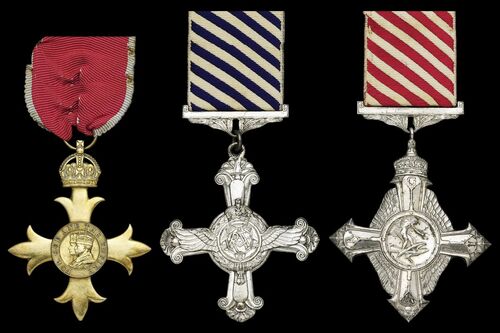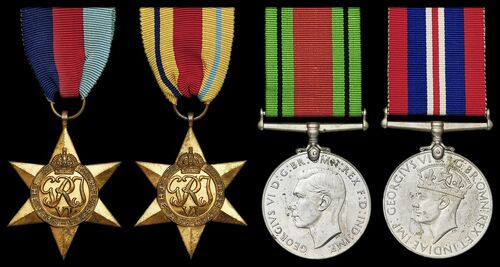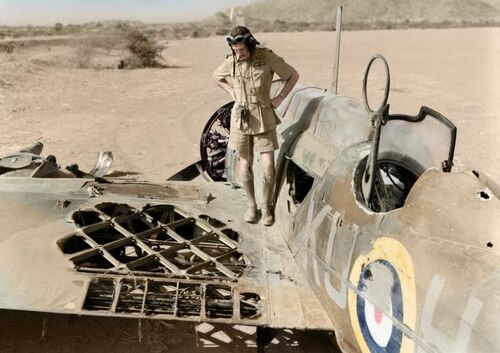Auction: 23002 - Orders, Decorations and Medals
Lot: 123
(x) The 1959 O.B.E., 'Battle of Keren 1941' D.F.C., 1945 A.F.C. group of seven awarded to Squadron Leader W. S. Kennedy, No. 47 Squadron, Royal Air Force Volunteer Reserve, latterly Chief Aerodromes Officer, Rhodesia & Nyasaland Department of Civil Aviation
The Most Excellent Order of the British Empire, O.B.E. (Civil) Officer’s 2nd Type, breast Badge, silver-gilt, in its Royal Mint case of issue; Distinguished Flying Cross, G.VI.R., the reverse officially dated '1941', in its case of issue; Air Force Cross, G.VI.R., the reverse officially dated '1945'; 1939-45 Star; Africa Star; Defence and War Medals 1939-45, good very fine (7)
O.B.E. London Gazette 1 January 1959.
D.F.C. London Gazette 29 April 1941. The original Recommendation states:
'One day in March 1941, this Officer was the Pilot of an aircraft on a bombing attack on a selected target in the Cheren [Keren] area. At the conclusion of his run over the target he was attacked by two enemy fighters. Incendiary bullets caused petrol from the port main tank to catch fire. As his Air Gunner was severely wounded he refused to abandon the aircraft and succeeded in extinguishing the flames, although a portion of the fittings of the main tank remained smouldering throughout the remainder of the flight. In order to obtain immediate medical assistance for his wounded Air Gunner, Pilot Officer Kennedy did not attempt to alight at an Advanced Landing Ground but returned to base where he successfully accomplished a difficult landing.'
A.F.C. London Gazette 14 June 1945.
Walter Sinclair Kennedy was born at Hampstead, London on 12 January 1912 and was a Civil Engineer by trade, living at Chalk-Mead, Grange Road, Ferring, Sussex. He took Aero Certificate No. 15926 at the South Coast Flying Club on a DH60 Gipsy on 16 June 1938, thence being commissioned into the Royal Air Force Volunteer Reserve during the Second World War.
Kennedy flew with No. 47 Squadron in Africa and earned his stunning D.F.C. on 25 March 1941, during the Battle of Keren. The image of him inspecting the damage to his aircraft was captured by the Imperial War Museum (IWM CM658) and has since been colourised, bearing the caption:
'Pilot Officer Walter Sinclair Kennedy (84999) of No. 47 Squadron RAF Detachment inspects the damage to his Vickers Wellesley Mk.I, (K7715) 'KU-H', at Agordat, Eritrea, after he was attacked by two Italian Fiat CR 42s while on a bombing attack on a selected target in the Keren area, on 25 March 1941.'
On that day his Wireless Operator (Air Gunner), Sergeant Douglas Alfred German, was mortally wounded and incendiary bullets hit the main fuel tank in the port wing causing it to catch fire. Kennedy executed a vertical dive to extinguish the flames and returned to the Detachment's base at Agordat, where he successfully accomplished a difficult landing. German sadly passed away the following day but the efforts of Kennedy were duly rewarded.
Having been married to Gwendoline Macpherson on 19 January 1942 at Asmara, he added the A.F.C. for good measure before War's end and went on to work for the Sudan Irrigation Department at Wad Hedani afterwards. Kennedy remained in Africa and rose to become Chief Aerodromes Officer for the Rhodesia & Nyasaland Department of Civil Aviation and was married for a second time, to Elizabeth Holliday on 1 September 1965 at Lusaka. Returned home, he died on 11 November 1984 at Camden; sold together with Air Ministry letter, dated 3 November 1945, addressed to the recipient in the Sudan, forwarding his two decorations and confirming his campaign medals.
Subject to 5% tax on Hammer Price in addition to 20% VAT on Buyer’s Premium.
Sold for
£3,000
Starting price
£1600









